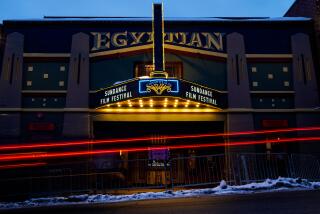Stealing Peeks at Sundance
The offers range from cash bribes to pledges of eternal friendship. Impostors will slip past security, and talent agents will betray their own colleagues. All this for a seat at the Academy Awards? Dinner with Cameron Diaz? No, this Hollywood hustle is aimed at an even more elusive target: an early peek at a Sundance Film Festival movie.
The nation’s most important film festival officially begins tonight, but the real Sundance competition opened a month ago. That’s when the festival’s lineup of 129 feature films was announced, launching a frenzy of cinematic espionage that rivals a John le Carre novel -- or, in some cases, “Get Smart.”
The Sundance festival is American independent film’s star-studded answer to a Christie’s auction. Hundreds of Hollywood executives pour into Park City, Utah, in search of the next “Blair Witch Project,” the low-budget thriller that sold in 1999 for less than $1 million but grossed more than $142 million in U.S. theaters.
But unlike antiques bidders who get a cocktail-and-canape preview of the goods, Sundance shoppers enjoy no early grazing. They are thrown into a screening room packed with their top competitors. By the time the final credits roll two hours later, they must not only make a decision about whether they want to buy the film to distribute it in theaters but also conclude how many millions they want to offer. Deliberate an hour too long, and another buyer swoops in and grabs the movie.
Given such stakes and Hollywood’s kill-or-be-killed ethics, it’s no surprise that buyers try to gain any advantage possible. One acquisitions executive says he has paid his staffers as much as $500 for every purloined cassette they delivered.
The week before “The Good Girl” premiered at last January’s festival, director Miguel Arteta held a private showing for co-star Jake Gyllenhaal. Just as the lights dimmed in the small Beverly Hills screening room, a man slipped into the theater, trying to look like he belonged.
“Who are you?” one of the film’s producers immediately inquired. “I’m a good friend of Matthew Greenfield,” the man replied. “And he personally invited me.” Only problem: The producer asking the questions was Matthew Greenfield, and he had never met the uninvited guest. “The guy just ran out of the theater,” Arteta says. “But you can’t fault him for trying.”
Arteta’s successful efforts to keep his film under wraps helped generate heavy interest for his dark romantic comedy starring Jennifer Aniston. After a frenzied first Sundance screening, “The Good Girl” sold to Fox Searchlight for $4 million. It turned into one of last year’s top art-house hits, grossing more than $14 million in North American theaters.
The secrecy is understandable. Allow your film to circulate before the festival begins, and it’s like giving a costly birthday present without gift wrap: There’s no eye-popping wonder when it’s unveiled.
“Sundance is all about urgency,” says producer-attorney John Sloss, who is selling eight Sundance films this year. He advises his filmmaker clients to protect their movies as if their livelihoods depended on it -- which they do. “Why not make the biggest impact you can?”
Finagling a sneak Sundance preview has taken on new importance as art-house films surge in popularity -- such films accounted for 7% of last year’s box office, a 3% increase from 2001.
“It’s almost to the point where acquisitions people will say, ‘You know, if you show me this movie first, you can have my wife for the weekend,’ ” says Michael Pierce, one of the producers of “The Cooler,” a Las Vegas romance starring William H. Macy that has some of the festival’s best advance buzz.
In this year’s Sundance lineup, “The Cooler” is but one of more than 20 movies about which buyers are trying to gather intelligence. But in a business as anti-egalitarian as Hollywood, the Sundance market follows remarkably impartial rules: Distributors as major as Miramax Films (Martin Scorsese’s “Gangs of New York”) and as minor as Strand Releasing (Argentina’s “Smokers Only”) both get to see a movie’s world premiere at the same time, in the same place.
Unless, of course, their acquisitions executives have somehow seized a bootleg videocassette beforehand.
“Obviously, there is an advantage to seeing a movie early,” says Patrick Gunn, Artisan Entertainment’s executive vice president. For the buyers, an early look may eliminate a movie from consideration or double its importance. A sneak peek is especially helpful when the festival holds concurrent screenings of high-priority movies, which is true at least five times in this year’s schedule.
“Every night, there are two to three screenings that you have to be on top of. It’s hard to cover everything,” says Amy Kaufman, senior vice president of acquisitions for Focus Features. Both Gunn and Kaufman say they haven’t yet seen any movies on cassette this year.
These unauthorized tapes -- sometimes duplicated so poorly that they look like a pirated “Star Wars” cassette peddled on a street corner -- can almost be a reverse indicator of a film’s true prospects. The finished films may scarcely resemble the early versions transferred to tape, and movies often play much better in a packed theater than in the living room VCR.
Bootleg copies of “Happy, Texas” circulated before the 1999 festival, and buyers who had seen the film beforehand pronounced it dead on arrival. After the comedy enjoyed a wild Sundance screening, a bidding war ensued, with Miramax buying the movie for a reported $10 million. (The film subsequently bombed in theaters.)
Most famous, cassettes of “The Blair Witch Project” turned up in almost every buyer’s office that same year. The early -- and, for many buyers, not very scary -- exposure may have helped deflate the movie’s sale price, although it was a blockbuster when it hit the multiplex.
Sean Furst, another “Cooler” producer, says he learned his lesson at 2000’s festival, when he was selling the infant-death drama “Everything Put Together.” Before its Sundance world premiere, cassettes of “Everything Put Together” were turning up everywhere but at the neighborhood Blockbuster.
“Basically, everybody had seen the movie before we even played at Sundance,” Furst says. “It could have been [leaked] by the festival. It could have been by the sound dubbing house. It’s amazing how many moles are out there.” The film did not get a distributor during the festival and eventually was released on a very limited basis.
Although as many as a dozen tapes have surfaced in the weeks leading up to past festivals, this year, only three bootleg Sundance videos appear to have been leaked ahead of time.
According to people who have seen them, the three titles making the cassette circuit are “Camp,” a musical reminiscent of “Fame”; Robert Downey Jr.’s “The Singing Detective,” a remake of the television miniseries; and “dot the i,” the first English-language movie starring “Y Tu Mama Tambien’s” Gael Garcia Bernal. “It’s just hard for me to believe” how a tape leaked out, says “Singing Detective” director Keith Gordon. Says an equally surprised Patrick Wachsberger, an executive producer of “dot the i”: “We have not done any duplication. There was no tape.”
With leaked tapes, no one is above suspicion. When the makers of “The Cooler” approached Oscar-winning composer John Barry (“Out of Africa”) about scoring the film, they sent a messenger to retrieve Barry’s cassette the day after he viewed it. When “The Cooler” was submitted for Sundance consideration, its producers chose to show the movie on film rather than send in a videocassette, in part out of fear that Sundance itself is a leaker of tapes.
Sundance festival director Geoff Gilmore says that’s “absurd,” noting that programmers keep cassettes in a locked cabinet. “It really hurts the festival. There is no advantage to our leaking tapes.” Still, an intern several years ago did circulate tapes, Gilmore admits.
Many buyers say talent agents frequently leak tapes. In the past, many of those tapes came from first-time directors and up-and-coming actors who sent out truckloads of Sundance cassettes to agents in their desperation to secure representation. But some of those agents then gave copies to friends who worked in acquisitions. Not surprisingly, filmmakers today rarely make those kinds of cassettes available before a film’s Sundance premiere.
If the acquisitions executives haven’t had much luck this year getting tapes, it’s not for lack of effort. One producer says an independent studio offered to increase by $200,000 the budget of another film he is making with the studio, on the condition he show his Sundance movie to its buyer first. The producer declined the kickback.
Even in a town where begging suggests weakness, there’s no such thing as Sundance shame. Buyers will beseech former allies in hopes of special treatment.
Lions Gate Films released 2000’s “The Eyes of Tammy Faye,” a popular Sundance documentary about Tammy Faye Bakker. At this year’s Sundance festival, “Tammy Faye” directors Fenton Bailey and Randy Barbato will showcase their first dramatic film, the Macaulay Culkin movie “Party Monster.”
“I called Fenton and Randy up and asked if I could see the movie ahead of time,” says Tom Ortenberg, Lions Gate Films president. “They politely but firmly said no.”
Some acquisitions executives say the maniacal cassette chase threatened to ruin the Sundance experience of watching -- and enjoying -- the best new work in American independent filmmaking.
“Two years ago, I would have felt naked going to Sundance without seeing as many movies as I could on tape. Everybody else did it, and you felt you had to,” says Sara Rose, United Artists’ senior vice president of productions and acquisitions.
“But now I don’t want to see any cassettes. Watching a tape is just not like watching a movie.”
More to Read
The biggest entertainment stories
Get our big stories about Hollywood, film, television, music, arts, culture and more right in your inbox as soon as they publish.
You may occasionally receive promotional content from the Los Angeles Times.











